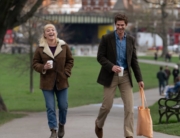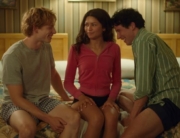Named the best Irish film by the Dublin Film Critics’ Circle at this year’s Dublin International Film Festival, the delicately beautiful My Sailor, My Love has roots in Scandinavia, courtesy of Finnish director Klaus Härö (The Fencer), Swedish cinematographer Robert Nordström, and screenwriters Kirsi Vikman and Jimmy Karlsson (who are Finnish and Swedish, respectively). Would this bittersweet tale of father-daughter estrangement and late-in-life love have been as effective in a Nordic setting? Perhaps, but with a dourer atmosphere.
Howard (a stoic James Cosmos), a retired sea captain, lives in stubborn isolation on the Irish coast, doing crossword puzzles and barely acknowledging the arrival of his daughter, Grace (a superb Catherine Walker), and her husband, Martin (Aiden O’Hare). They are here to celebrate Howard’s birthday, but Grace is taken aback by the squalor of the kitchen, including a pair of underpants soaking in the sink. Grace chides her father, “Dad, you didn’t use the washing machine we gave you.” He washes his clothes in his own way, he replies abruptly. Clearly, tension exists between the two.
It falls to a harried, tense Grace to clean up the mess before her globe-trotting brothers and their wives arrive. They bring gifts of rum, which Howard readily accepts although he no longer drinks. But when Grace offers him a slice of the birthday cake she brought, he brushes it aside. Later at the pub, a pained Grace watches as he accepts another slice of cake and regales the children in the audience with tales of his seafaring adventures. The unloving father has become a different man.
To alleviate her stress as she juggles her job as a nurse and caring for her father, Grace hires Annie (a subtle Bríd Brennan) as Howard’s housekeeper for two days a week. She warns her, “He very much needs to be in command of his ship, and I recommend that you be as unobtrusive as possible.” Things do not go well as first, with a brusque Howard offering Annie 500 euros to leave and never come back.
But an act of kindness and Annie’s delicious cooking softens Howard’s stony defenses (kudos to cinematographer Nordström for making a prosaic plate of corned beef and cabbage look as lusciously savory as beef bourguignon), and soon he and the widowed Annie embark on what first appears to be a predictable senior romance. Overshadowing their growing relationship is Grace’s bitter anger, which she struggles to overcome in group therapy sessions that she reluctantly attends at her increasingly alienated husband’s request.
What she wants most from her father is the acknowledgement of the pain she suffered when he increasingly spent time at sea, abandoning his 14-year-old daughter to care for his severely depressed, suicidal wife. Watching her remote parent transformed by love into a warm and caring patriarch who is also welcoming to Annie’s extended family and affectionate to her granddaughters drives Grace into a quiet but heartbreaking rage: “They’re not your girls, Dad. I am your girl.”
Sensitively directed with outstanding performances from its three leads, Härö’s film only hits a few minor false notes. A shot of Howard and Annie’s hands touching as they reach for the same apple is out of the rom-com playbook. And it would have taken more than a few hours for Grace alone to miraculously clean Howard’s pigsty of a kitchen to a spic-and-span condition.
The starkly stunning Irish landscape is also a star. Indeed, its gorgeousness almost distracts from the storyline. Filmed on Achill Island (the site also for the Oscar-nominated The Banshees of Inisherin) and in County Mayo, the movie features plenty of drone shots of Grace and Howard driving along narrow coastal roads and down the long gravel driveway to his house on the bay. The final image will remind some viewers of the closing scene of another Irish release, God’s Creatures.
What’s most interesting about this sad and moving film is the notion that some relationships can’t be fixed, some wounds can’t be healed. That’s life.

















Leave A Comment